| Article ID | Journal | Published Year | Pages | File Type |
|---|---|---|---|---|
| 5041989 | Human Movement Science | 2017 | 11 Pages |
â¢Sleep assisted the learners as young as 6 years of age in acquiring explicit procedural motor skills.â¢In skill learning, the 6-year-olds improved finger tapping speed to a greater extent older ones.â¢Sleep resulted in faster motor speed whereas movement accuracy remained unaffected.â¢The circadian factors might not affect on-line and off-line motor learning in children.â¢There was no noticed interference between the skill tests for children.
Motor skill acquisition occurs while practicing (on-line) and when asleep or awake (off-line). However, developmental questions still remain about whether children of various ages benefit similarly or differentially from night- and day-time sleeping. The likely circadian effects (time-of-day) and the possible between-test-interference (order effects) associated with children's off-line motor learning are currently unknown. Therefore, this study examines the contributions of over-night sleeping and mid-day napping to procedural skill learning. One hundred and eight children were instructed to practice a finger sequence task using computer keyboards. After an equivalent 11-h interval in one of the three states (sleep, nap, wakefulness), children performed the same sequence in retention tests and a novel sequence in transfer tests. Changes in the movement time and sequence accuracy were evaluated between ages (6-7, 8-9, 10-11Â years) during practice, and from skill training to retrievals across three states. Results suggest that night-time sleeping and day-time napping improved the tapping speed, especially for the 6-year-olds. The circadian factor did not affect off-line motor learning in children. The interference between the two counter-balanced retrieval tests was not found for the off-line motor learning. This research offers possible evidence about the age-related motor learning characteristics in children and a potential means for enhancing developmental motor skills. The dynamics between age, experience, memory formation, and the theoretical implications of motor skill acquisition are discussed.
